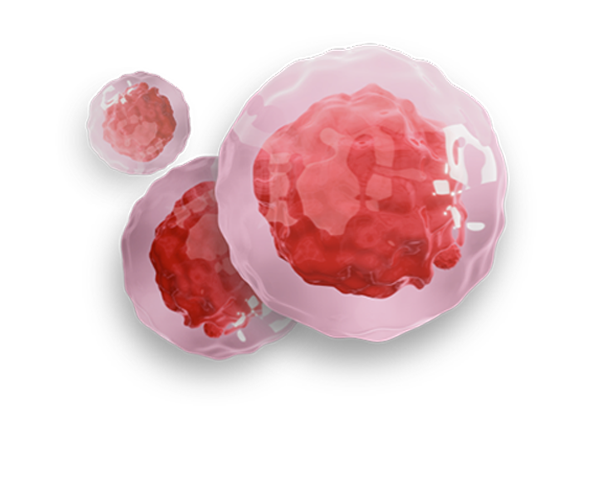A New Era of Vaccines
For the Czech Republic
For the Czech Republic
Novavax, Inc. is a global biotechnology company committed to helping address serious infectious diseases globally through the discovery, development, and delivery of innovative vaccines to patients around the world.
Our technology
Our vaccine technology leverages our proprietary recombinant protein-based nanoparticle technology and the immunogenicity-enhancing properties of our Matrix-M™ adjuvant.
Nanoparticles: By organizing recombinant proteins in a nanoparticle, it may help the immune system recognize that target protein from different angles1—the same way that the immune system would see the details of a real pathogen. In our vaccines, there’s no actual virus, just the protein; therefore, these vaccines can't cause disease.
Matrix-M adjuvant: Our Matrix-M adjuvant comes from saponins, naturally occurring compounds in the bark of the Quillaja saponaria (Soapbark) tree, commonly found in Chile. Saponins have a long history of being used for their medicinal properties.2 A vaccine containing another saponin-based adjuvant has previously been approved by the European Medicines Agency (EMA).3

Our areas of research
The world urgently needs new tools to help solve some of our greatest infectious disease challenges. Novavax is applying our unique technology to address current, emerging, and future public health threats. Novavax continually conducts clinical trials, investigations, and gathers real-world evidence in order to develop vaccines to address public health threats. Our scientists in our research and development (R&D) programs are committed to the efficient delivery of new vaccines while maintaining the safety of participants who take part in our trials.

Our product
Nuvaxovid▼ dispersion for injection COVID-19 Vaccine (recombinant, adjuvanted)
For healthcare professionals, please visit https://cz.novavaxcovidvaccine.com/hcp
For more information, please contact your healthcare professional.

+420 228 880 267
09:00 - 17:00
Monday - Friday
Our location:
Bohumil facility: Bohumil 138, 281 63 Jevany, Czech Republic
Prague office: Opatov Park office, Líbalova street 2348/1, Prague - Opatov, Czech Republic
Email: [email protected]
Phone: +41 44 553 05 71
To contact a member of the investor relations team, click on the "Contact us" button below.
- Krueger S, et al. Structural characterization and modeling of a respiratory syncytial virus fusion glycoprotein nanoparticle vaccine in solution. Mol Pharm. 2021;18(1):359–376.
- Marciani DJ. Elucidating the mechanisms of action of saponin-derived adjuvants. Trends Pharmacol Sci. 2018;39(6):573-585.
- Shingrix. Prescribing information. GSK; 2017.
- World Health Organization. WHO Coronavirus (COVID-19) Dashboard. https://covid19.who.int [Accessed November 2022].
- Centers for Disease Control and Prevention (CDC). Scientific Brief: SARS-CoV-2 Transmission. https://www.cdc.gov/coronavirus/
2019-ncov/science/science-briefs/ [Accessed November 2022].sars-cov-2-transmission.html - CDC. People with Certain Medical Conditions. https://www.cdc.gov/coronavirus/
2019-ncov/need-extra-precautions/ [Accessed July 2022].people-with-medical-conditions.html - World Health Organization. Influenza (seasonal)World Health Organization. Influenza (seasonal). Available at: https://www.who.int/en/news-room/fact-sheets/detail/influenza-(seasonal) [Accessed November 2022].
- Krammer F, et al. Influenza. Nat Rev Dis Primers. 2018;4(1):3.
- Borchers AT, et al. Respiratory syncytial virus—a comprehensive review. Clin Rev Allergy Immunol. 2013;45:331–379.
- Verwey C, Nunes M. RSV lower respiratory tract infection and lung health in the first 2 years of life. Lancet Glob Health. 2020;8(10):e1247–1248.
- Fasley A, Walsh E. Respiratory syncytial virus infection in elderly adults. Drugs Aging. 2005;22:577–587.
- Shi T, et al. Global, regional and national disease burden estimates of acute lower respiratory infections due to respiratory syncytial virus in young children in 2015; a systematic review and modelling study. Lancet. 2017;390(10098):946-958.
- Gonik B. The burden of respiratory syncytial virus infection in adults and reproductive-aged women. Glob Health Sci Pract. 2019;7(4):515-520.
- Azhar EI, et al. The Middle East respiratory syndrome. Infect Dis Clin North Am. 2019;33:891–905.
- Memish ZA, et al. Middle East respiratory syndrome. Lancet. 2020;395:1063–1077.
- Chafekar A, Fielding BC. MERS-CoV: Understanding the latest human coronavirus threat. Viruses. 2018;1093.
- Schindewolf C, Menachery VD. Middle East respiratory syndrome vaccine candidates: cautious optimism. Viruses. 2019;11:74.
- Weiss SR, Navas-Martin S. Coronavirus pathogenesis and the emerging pathogen severe acute respiratory syndrome coronavirus. Microbiol Mol Biol Rev. 2005;69:635–664.
- World Health Organization. Summary of probable SARS cases with onset of illness from 1 November 2002–31 July 2003. 24 July 2015. Available at: https://www.who.int/publications/m/
item/summary-of-probable-sars-cases-with-onset-of-illness-from-1-november-2002-to-31-july-2003 [Accessed November 2022]. - World Health Organization. Severe Acute Respiratory Syndrome (SARS). Available at: https://www.who.int/health-topics/severe-acute-respiratory-syndrome#tab=tab_1 [Accessed November 2022].
- World Health Organization. Malaria fact sheet. Available at: https://www.who.int/news-room/fact-sheets/
detail/malaria [Accessed November 2022]. - Jacob ST, et al. Ebola virus disease. Nat Rev Dis Primers. 2020;6:13.
- CDC. Cost of the ebola epidemic. Available at: https://www.cdc.gov/vhf/ebola/
history/2014-2016-outbreak/ [Accessed November 2022].cost-of-ebola.html